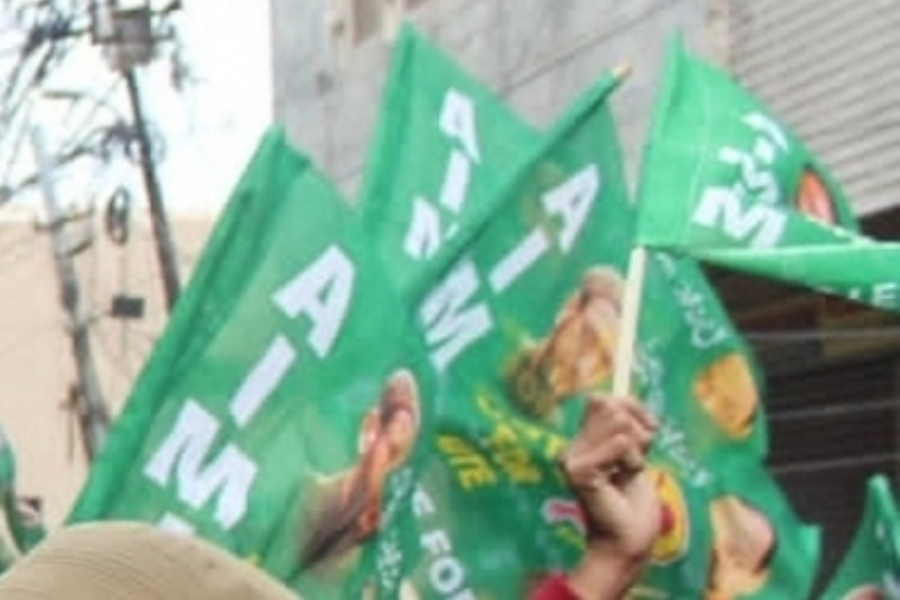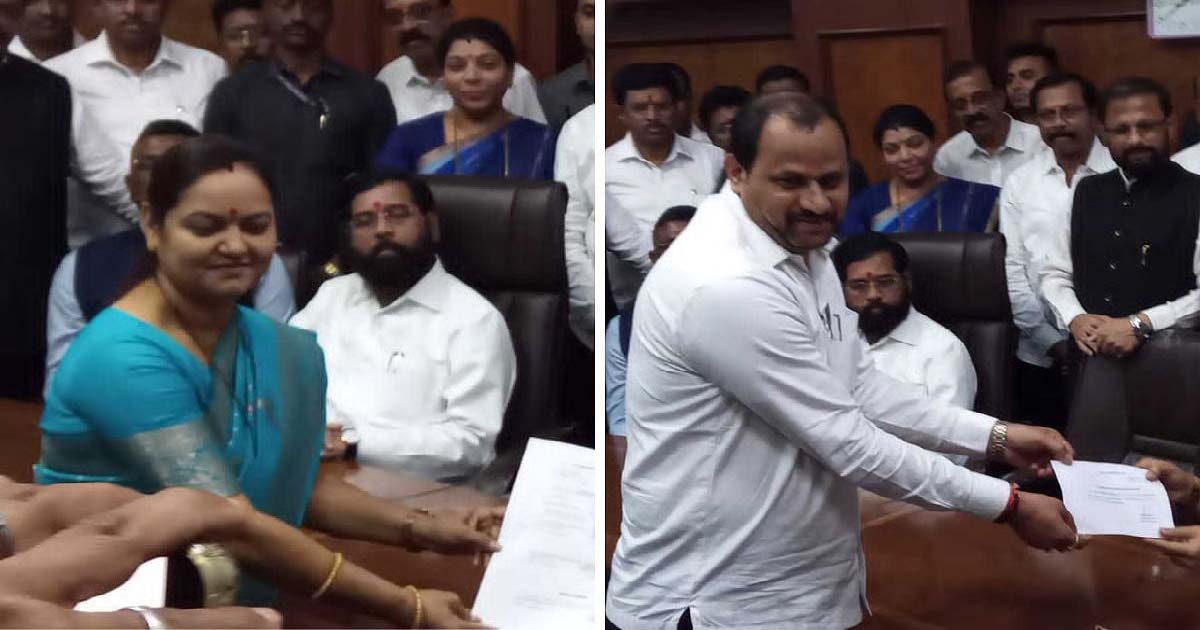Politics
AIMIM to give a fight to Congress in Gujarat

The All India Majlis-e-Ittehadul Muslimeen’s (AIMIM) entry into Gujarat politics may not have a significant impact but it is definitely going to affect the Congress party.
Muslim community leaders fear that if the AIMIM puts up its candidates in Muslim dominated seats, their representative strength will fall further in the state assembly. Once there were at least eight Muslim MLAs in the state assembly. The number has fallen to three after the 2017 assembly elections.
AIMIM President Asaduddin Owaisi visited Gujarat on Sunday and Monday and addressed two public meetings, one in Ahmedabad and another in Chhapi in Vadgam taluka of Banaskantha district.
The venues of the meetings clearly indicate that the party is targeting constituencies where the Congress has a presence and its representatives have got elected. Chhapi is the place where the biggest protest against the Citizenship (Amendment) Act and the National Register of Citizens had taken place.
Chhapi falls under Vadgam assembly constituency which is reserved for Scheduled Castes. Jignesh Mevani got elected in 2017 as an independent MLA from here and has now joined the Congress.
The Muslim population in the state is 58.47 lakh – 9.67 % of the total population. Going by these numbers, it should have 18 representatives in the assembly.
There are at least 20 assembly seats where Muslims have a more than 20 per cent vote share, but hardly two to three Muslims get elected to the assembly. “Now if AIMIM enters the fray, it will divide Muslim votes further, affecting the Congress party’s prospects,” feels Adam Chaki, Congress leader and candidate from Bhuj constituency in the 2017 elections.
Chaki said that at least on 34 to 35 seats, the Muslim vote share is around 15 to 16 per cent, but the parties are not taking a risk and are fielding more Muslim candidates. According to him, the AIMIM will field candidates in two constituencies: Kutch district, Bhuj and Abdasa, on Jamnagar seat; and two in Ahmedabad in Jamalpur-Khadia and Dariapur. It is less likely to field candidates in Jambusar, Vagra and Bharuch constituencies in Bharuch district.
When it comes to the BJP, it is “least concerned with AIMIM’s entry,” says Mohsin Lokkhanwala, president of the BJP minority cell, and adds that the AIMIM can’t divide nationalist Muslim votes as those Muslims who believe in the BJP’s one nation theory are committed voters of the nationalist party.
The AIMIM is receiving a good response. Said Sabir Kabliwala, state president of the AIMIM, “It is not decided on how many seats the party will field its candidates. The party is conducting a survey and based on its conclusions, the party will field its candidates.”
This party’s entry in the state has already started denting the Congress vote bank. “See the results of Modasa and Godhra nagar palika and Ahmedabad municipal corporation elections. In Modasa, in second elections 16 councillors got elected, all on Congress symbols. All were Muslims. In 2021, 16 got elected, but nine on AIMIM symbols and seven on Congress,” elucidated Shafi Madani, national secretary of Jamat-e-Islami-Hind.
Though Muslims have a good presence in more than 50 seats, its representatives are less because parties field less number of Muslim candidates. After fielding Muslim candidates, they are left on their own and have little support from the party and the non-Muslim community, that is why their victory is dependent on how much Muslim votes one garners, elaborates Shafi Madani.
Business
Centre’s fertiliser supplies to states scale record high of 530 lakh metric tons in April-December

New Delhi, Jan 30: Fertiliser movement from the Centre to the states on Indian Railways, during the first nine months (April-December) of the financial year 2025-26, reached an all-time high with total supplies crossing 530.16 lakh metric tons to surpass the 500 lakh metric ton mark for the first time during this period, an official statement said on Friday.
This represents a 12.2 per cent increase over the corresponding period of FY 2024–25 and is 8.5 per cent higher than the previous record of FY 2023–24, it said.
The Centre has ensured sufficient availability of all major fertilisers across states, including the supply of 350.45 lakh metric tons of urea, against a requirement of 312.40 lakh metric tons in the first nine months (April-December) of the financial year 2025-26. Similarly, in the case of major P&K (phosphorous and potassium) fertilizers including DAP, MOP & NPKS, the total supply reached 287.69 lakh metric tonnes against the requirement of 252.81 lakh metric tonnes, consistently exceeding the assessed requirement and ensuring uninterrupted availability, the statement said.
Faster and smoother movement of fertiliser rakes enabled timely supplies to states, ensuring that farmers did not face any shortages during the critical stages of cultivation. Department of Fertilisers worked in close cooperation with the Ministry of Railways and stated that such coordinated efforts have helped ensure adequate availability of fertilisers across the country, the statement added.
During this period, average rake loading on Indian Railways increased to 72 rakes per day in July 2025, rose to 78 rakes per day in August 2025 and reached 80 rakes per day in September 2025, according to the official figures.
Urea rake movement rose to 10,841 rakes, registering an 8 per cent increase over last year, while P&K fertilisers recorded 8,806 rakes, marking an 18 per cent growth. Enhanced coordination with the Ministry of Railways, ports, state governments, and fertiliser companies ensured seamless and timely supply to states during peak agricultural seasons, the statement said.
Ensuring the timely availability of fertilisers to farmers has remained one of the government’s highest priorities. In this direction, the improved coordination between the Ministry of Railways and the Department of Fertilisers during Kharif 2025 and the ongoing Rabi season was clearly visible at the ground level. The states also took concerted measures to ensure last-mile availability to farmers, the statement added.
National News
Shinde Sena’s Sharmila Pimpolkar Set To Become Thane Mayor, BJP’s Krishna Patil Deputy Mayor; Both Elected Unopposed

Thane: Sharmila Rohit Pimpolkar of the Shiv Sena (Shinde faction) is set to be appointed as the Mayor of the Thane Municipal Corporation (TMC), while Krishna Dadu Patil of the Bharatiya Janata Party (BJP) will assume charge as the Deputy Mayor. Both leaders were elected unopposed after filing their nominations on the final day for submitting nomination papers for the mayoral posts.
Pimpolkar filed her nomination for the Mayor’s post, while Patil submitted his papers for the Deputy Mayor’s position. No other candidates entered the fray for either post, clearing the way for their unopposed election. The official announcement confirming their appointments is scheduled to be made on February 3.
A meeting related to the mayoral election process was held at the Thane Municipal Corporation headquarters in the presence of Deputy Chief Minister Eknath Shinde. Several senior leaders attended the meeting, including Transport Minister Pratap Sarnaik, Thane MP Naresh Mhaske, BJP MLA Niranjan Davkhare, Ravindra Phatak and other party functionaries.
Meanwhile, reports indicated that the Shinde Sena has categorically refused the BJP’s demand to rotate the Mayor’s post for two years in Thane. In the recently concluded Thane Municipal Corporation elections, the Shinde Sena emerged as the dominant force with 75 seats, while the BJP secured 28 seats. Citing its clear numerical strength, the Shiv Sena has reportedly conveyed at the local level that it will not hand over the Mayor’s post to the BJP even for a year.
Following the refusal, BJP leaders are said to have staked claim to key power centres within the civic body, including the Standing Committee, Transport Committee, various subject committees, ward committees and the Education Board. Shinde Sena reportedly proposed that the BJP accept the Deputy Mayor’s post, while committees and ward panels could be shared between the two parties for fixed tenures of three and two years respectively.
Maharashtra
Crackdown on illegal street vendors in Andheri, Mumbai Municipal Corporation’s ‘K-Waste’ department takes action, citizens are relieved

Mumbai: Around 200 unauthorised hawkers and additional structures on footpaths in Ram Ganesh Gadkari Marg (Arla Marg) area of Andheri (West) in Mumbai were evicted by the Mumbai Municipal Corporation’s ‘K-West’ department yesterday (January 29, 2026). The operation, as per the instructions of Municipal Corporation Commissioner and Administrator Bhushan Gagrani, was conducted under the guidance of Deputy Commissioner (Zone-4) Bhagya Shri Kapse, and Assistant Commissioner (K-West Division) Chakrapani Ale. Unauthorised additional structures were found on footpaths connecting Swami Vivekananda Marg and Gulmohar Marg in Andheri (West) and on Ram Ganesh Gadkari Marg (Arla Marg) adjacent to the entrance of Dr. No. Cooper Hospital. It was also observed that unauthorised hawkers have set up shops in this area. It was creating obstacles for ambulances bringing patients to Cooper Hospital in case of emergency and for pedestrians to walk on the footpaths.
In this context, an eviction drive was launched by the ‘K-West’ administrative department of the Mumbai Municipal Corporation. Under this, around 200 unauthorized hawkers and unauthorized additional structures established on the footpaths in this area were evicted.
The eviction was carried out with the help of 04 encroachment removal vehicles, 03 JCBs and other equipment. During this operation, an adequate police force including 100 officers and employees of the Municipal Corporation were deployed. Local representatives and citizens are expressing satisfaction over this action. The Municipal Corporation administration has made it clear that regular evictions against unauthorized structures will continue in the future.
-

 Crime3 years ago
Crime3 years agoClass 10 student jumps to death in Jaipur
-

 Maharashtra1 year ago
Maharashtra1 year agoMumbai Local Train Update: Central Railway’s New Timetable Comes Into Effect; Check Full List Of Revised Timings & Stations
-

 Maharashtra1 year ago
Maharashtra1 year agoMumbai To Go Toll-Free Tonight! Maharashtra Govt Announces Complete Toll Waiver For Light Motor Vehicles At All 5 Entry Points Of City
-

 Maharashtra1 year ago
Maharashtra1 year agoFalse photo of Imtiaz Jaleel’s rally, exposing the fooling conspiracy
-

 National News1 year ago
National News1 year agoMinistry of Railways rolls out Special Drive 4.0 with focus on digitisation, cleanliness, inclusiveness and grievance redressal
-

 Maharashtra1 year ago
Maharashtra1 year agoMaharashtra Elections 2024: Mumbai Metro & BEST Services Extended Till Midnight On Voting Day
-

 National News1 year ago
National News1 year agoJ&K: 4 Jawans Killed, 28 Injured After Bus Carrying BSF Personnel For Poll Duty Falls Into Gorge In Budgam; Terrifying Visuals Surface
-

 Crime1 year ago
Crime1 year agoBaba Siddique Murder: Mumbai Police Unable To Get Lawrence Bishnoi Custody Due To Home Ministry Order, Says Report






















